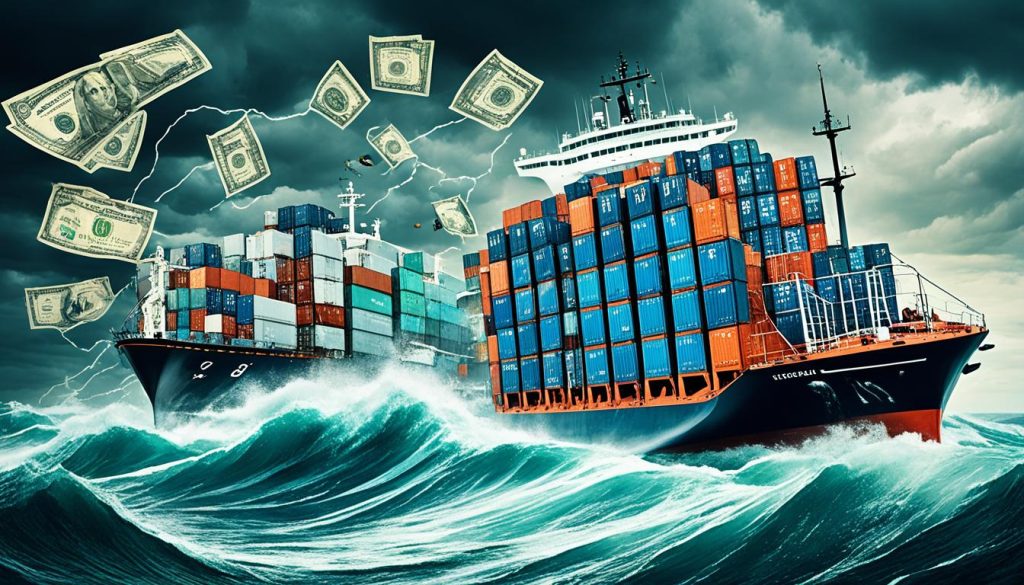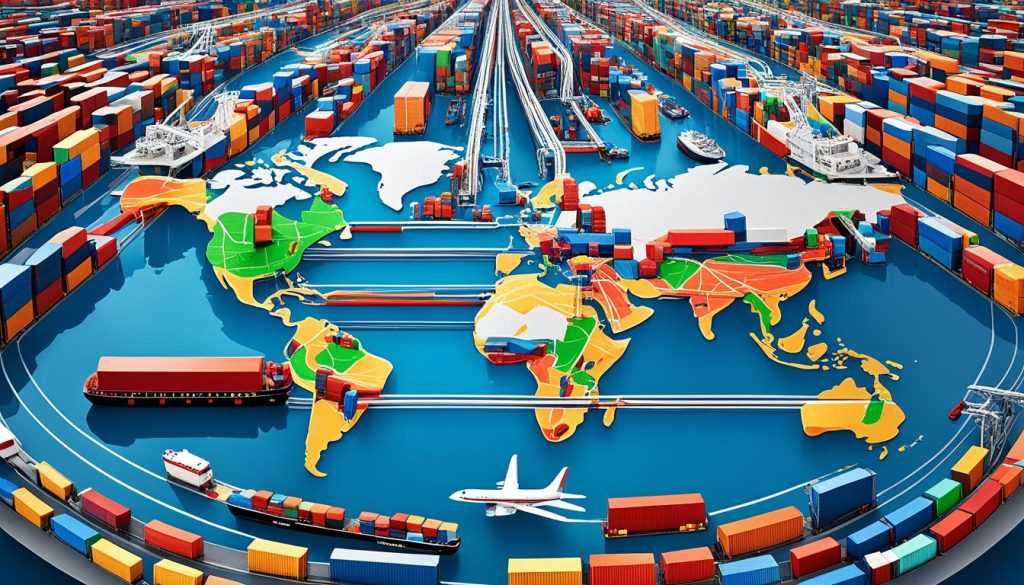When businesses step into international waters, they find both big opportunities and various risks. Tackling the world market introduces problems like changes in currency values and political issues. These challenges could shake up a company’s income and impact its performance.
Companies can tackle these risks by using strategies like hedging and getting political risk insurance. These methods help manage dangers in international trade. Also, going global can cut down on costs for resources and open up new markets. Finding the right balance between the gains and challenges of going international is key for growth.
Key Takeaways
- International operations bring opportunities and big risks.
- Changes in currency values and political issues are common challenges in global trade.
- Using hedging and getting political risk insurance are good ways to manage risks.
- Global expansion offers access to cheaper resources and bigger markets.
- It’s important to weigh the benefits and risks for successful international business.
Introduction to International Business Risks
Starting trade across borders comes with many challenges. It’s vital for businesses to understand and tackle these financial risks. By knowing the unstable nature of global markets, companies can plan better.
Overview of Risks
Entering international markets exposes companies to risks like shifts in currency value. Also, changing government policies add to the uncertainty. Knowing these risks helps in managing them well.
Importance of Risk Management
It’s important for a business to be proactive in identifying risks. Doing thorough market research and understanding cultural and legal differences are key. This helps in making a solid plan against financial risks.
This way, companies can operate smoothly and face fewer interruptions. It also helps in keeping the business successful in the long run.
Foreign Exchange Risk
Foreign exchange risk is a big challenge for companies trading internationally. It happens when exchange rates change. This leads to ups and downs in the value of investments. Businesses working globally must watch currency market changes closely.
Currency Value Fluctuations
The ups and downs in currency markets can shake a business’s financial health. Managing FX risk is key for firms doing business overseas. They need to act early to reduce losses from exchange rate shifts, keeping their profits safe.
Examples of FX Risk Impact
FX risks can show up in different ways. Take a U.S. car company in Japan, for example. If the yen gets weaker against the dollar, the firm’s earnings would drop. This shows how important it is for importers and exporters to manage FX risks well.
Political Risk
For businesses around the world, political risk is vital to consider. Changes in government policy can greatly affect them. They might face new trade barriers or unexpected tariffs, hurting their profits.
Changes in Government Policies
Companies working internationally often deal with geopolitical uncertainties. A new government might bring in tough rules or change trade deals. These shifts can affect how businesses operate and force them to be flexible.
Trade Barriers
Trade can face hurdles like quotas or tariffs. These barriers reduce market access and raise costs. Despite free-trade agreements easing some worries, trade wars and protective policies can still pose challenges. Businesses must stay smart and knowledgeable to cope.
Legal and Compliance Challenges
Understanding legal and compliance issues is key for firms in global trade. They must know local laws, make sure contracts are right, and keep up with laws. This covers major areas in detail:
Understanding Local Regulations
Complying with trade laws varies by place. Businesses need to understand local rules to avoid fines and ensure smooth deals. Sometimes, actions allowed in one country are banned in another. This shows why knowing and following local laws is vital. Good record-keeping helps avoid legal troubles and keeps things transparent.
Ensuring Contractual Compliance
Contracts form the basis of global business deals. It’s important they are legally solid. Firms should get legal help to create, check, and update contracts to meet global standards. This prevents legal issues and builds trust in international projects. As global laws change, contracts must be reviewed and adjusted to stay strong.
Market and Cultural Differences
Businesses looking to go global must understand market and cultural differences. These require deep insight and a careful approach for adapting to the global market.
Adaptation to Local Markets
Adapting means changing products and services to fit local tastes and demands. Learning about what locals like and buy can really help a business stand out in a new market.
Many worldwide brands, like McDonald’s, have done well by fitting their offerings to local cultures and diets. This kind of thinking can build strong brand loyalty and success in the market.
Challenges of Cultural Integration
Cultural integration can be tough, especially if businesses don’t fully consider the local culture. Not being sensitive enough can cause misunderstandings and lost opportunities. It’s wise to work with local experts who understand the culture well.
Doing thorough research on international markets shows respect for local customs and traditions. Also, a team with members from different cultures can help a business adapt better globally. Such teams bring diverse views that are key in tackling cultural challenges.
- Carry out detailed market and cultural studies.
- Work together with local experts and partners.
- Tailor your products and ads to what locals prefer.
- Train your staff on being culturally aware and respectful.
Supply Chain and Logistics Risks
For businesses to keep goods moving globally, managing the supply chain well is key. Yet, these chains often face disruptions. It’s vital for companies to tackle these issues head-on to keep their operations strong and reliable.
Efficiency of Supply Chains
To keep supply chains running smoothly, thinking ahead about sourcing and logistics is important. By using suppliers from different areas, businesses can handle disruptions better. Having several sources and routes for goods helps avoid over-reliance on just one supplier.
Risks of Disruptions
Disruptions can happen for many reasons like natural disasters, political problems, or transport strikes. To deal with these, companies should regularly check for risks. They should also have backup plans for different routes and suppliers, to keep things moving no matter what.
Financial Risk Management Strategies
Effectively managing financial risks is key to keeping a stable flow of income. It also ensures a business can last long in the worldwide market. We’ll look into currency hedging and business insurance, two important parts of managing financial risks.
Hedging Techniques
Using currency hedging methods is essential to protect against market swings. By using futures, forwards, and options, businesses can have more stable cash flows. This helps reduce the negative impact of changing currency values. For example, forward contracts allow a business to set exchange rates now. This prevents future losses, making financial risk planning better.
Insurance Options
Business insurance is another key way to guard against risks. It protects from losses caused by sudden government actions like expropriation. This means businesses can keep going strong, even when unexpected political changes happen. It makes global operations smoother and safer.
Combining solid currency hedging strategies with good business insurance coverage is crucial. It’s important for effectively planning against financial risks. This approach helps companies face the challenges of international trade confidently.
Role of Technology in Risk Mitigation
Nowadays, keeping up with the complex world of international business requires the use of technology. Using digital tools for compliance and automation helps make global trade smoother. It not only makes errors less likely but also boosts overall performance.
Automation Benefits
Automation brings a lot of perks to global trade. It makes things more accurate and speeds up processes. With automated systems, businesses can cut down on mistakes, save on labour costs, and keep operations steady. Plus, it helps stick to the rules of different countries, which lowers the risk of fines.
Technology-driven Solutions
In our ever-changing world market, leaning on technology is key. Digital compliance tools ensure accurate records and quick responses to new rules. They also make tracking and reporting transactions easy, which is vital for being open and responsible. By adopting new technologies, companies can work more efficiently and avoid potential risks better.
Operational Challenges in High-Risk Areas
Businesses in high-risk areas face special challenges. They need careful planning and strong strategies. This way, they can keep their people and assets safe.
Assessing Political Stability
Checking geopolitical risks is key in unstable areas. It’s about knowing the political scene and what government changes mean. Also, being aware of possible conflicts helps in avoiding big operational problems.
Making deep assessments leads to smarter choices. And it helps in steering clear of dangerous surprises.
Protecting Staff and Assets
Keeping safety in these places means having strong security steps. This includes better surveillance and working with local forces. Plus, making emergency plans for quick action is crucial.
Emergency plans teach employees how to evacuate. They also ensure important things are well protected.
By concentrating on managing these risks, companies can keep going strong. Even in the toughest places, they can succeed.
Operating Internationally Exposes Businesses
Working in different countries can lead to growth but also comes with risks. Businesses face challenges like currency changes, political issues, and supply chain problems. This situation needs careful risk management.
When going global, companies weigh up benefits against risks. Entering new markets can be profitable but foreign exchange rates might affect earnings. Political changes can also make things difficult by changing rules.
Businesses should have a strong plan to deal with these risks. They need to keep an eye on the business climate, get political risk insurance, and mix up their supply chains. Using hedging strategies helps reduce money loss from currency changes. This makes trading across borders smoother.
The challenges of global business highlight the need for good preparation. A solid risk management plan protects companies. It also helps them make the most of global opportunities and succeed in new markets.
Case Studies and Real-world Examples
Looking into various international business case studies offers key insights into global trade’s successes. These examples show how firms skillfully handle risks and grab opportunities. We will explore some success stories that showcase strategic planning and effective execution in international trade.
Success Stories
Samsung’s growth in India is remarkable. They understood local market trends and customer likes, tailoring products to fit. This led to their growth and a strong market position. Unilever in Latin America is another example. They used local culture in their marketing, boosting sales and loyalty.
Learning from Failures
Looking at others’ failures teaches us too. For instance, Walmart’s exit from Germany highlights the need for cultural understanding. They did not fully grasp cultural nuances or the market’s complexity, resulting in poor performance and unhappy customers. Carrefour’s departure from South Korea shows the risks of neglecting local competition and consumer habits.
These cases underline the value of learning from both wins and losses in global trade. Success comes from careful planning, understanding cultures, and adapting strategies to each market. This approach helps firms succeed in the complex world of international markets.
Developing a Risk Management Plan
In today’s global business world, a strong risk management plan is essential. It starts with spotting all possible risks. This means companies can plan for challenges that come without warning. By doing this, businesses can protect their work abroad.
Assessment of Potential Risks
Firstly, knowing the risks is key. This involves looking at issues like changes in money value, political unrest, and problems with suppliers. Regular reviews help firms prepare for future issues by keeping an eye on industry and world changes. Keeping this assessment updated makes sure the plan works well.
Strategies for Risk Mitigation
To do well globally, firms must reduce risks smartly. This includes following rules, both local and global, and building a culture aware of risks. Using insurance for coverage helps too. Teaming up with local groups aids in understanding the market better. This approach not only strengthens the company but also supports steady growth worldwide.















